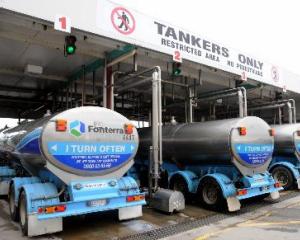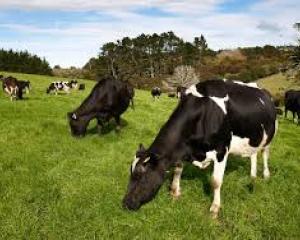Fonterra plays such an important role in the New Zealand economy, and its presence in the global economic structure, that news the dairy giant is increasing its farmgate milk price created something of a collective sigh of relief.
The record price forecast from Fonterra will add $4 billion extra to the economy from dairying in the 2014 season.
That takes it towards 2% of New Zealand's gross domestic product, or total economic activity, a significant number in any language.
Fonterra lifted its forecast by 30c a kilogram of milk solids to a record $7.80, attributing it to continuing strong international dairy prices.
The rise removes recent fears Fonterra's revenue, and New Zealand's international reputation, would be hurt from a consumer backlash over recent product contamination scares that have been proved groundless.
The forecast increase is a welcome boost after a difficult few weeks with Fonterra finding itself in the headlines for the wrong reasons.
The co-operative has been dogged by claims of contamination in some of its products, particularly in China, but also in parts of the Indian subcontinent.
Bangladesh is the latest country to restrict Fonterra products, pending tests. Those tests are almost sure to come back negative, but negative is also how many importers are viewing one of New Zealand's premium export products.
Financial forecasters predicted two weeks ago the episodes of contamination would tarnish the image of Fonterra and New Zealand but were unlikely to affect the firm's earnings.
The products in question account for a relatively small proportion of the company's overall volumes.
The cost of product recalls will likely be covered by insurance. The whey contamination scare was not the first time Fonterra had faced product issues.
In September 2008, one of China's largest dairy companies, Sanlu, then 43% owned by Fonterra, was charged with supplying contaminated milk containing melamine.
Around 300,000 babies were affected, six of whom died, after consuming the tainted milk. Four years later, Fonterra advises certain milk samples contain low levels of fertiliser.
Fonterra has faced criticism at several levels about its actions in dealing with various threats to its products and several inquiries are under way.
The Ministry of Primary Industries, itself no shining light in ensuring New Zealand exports get across Chinese wharves, put people inside the Fonterra headquarters to provide help. Now, the tests have proved negative, Fonterra must explain how its processes got things so wrong.
One thing has become abundantly clear for a considerably larger domestic audience: Fonterra is important to the economic growth of this country.
Opposition politicians complaining about putting the country's future in the one basket of dairy, are too late and need to have a reality check. Dairy is important.
Strangely, Federated Farmers dairy chairman Willy Leferink is blaming the media for a disproportionate reaction in reporting on the Fonterra scares.
Mr Leferink seems to have been blinded by the forecast payout, at the expense of looking around the world at international reaction to contaminated food.
From the richest to the poorest, consumers are nervous about food that may be contaminated and blaming the media for Fonterra's oversight is a considerable leap for Mr Leferink to make.
Happily, the Fonterra Shareholders Council is more realistic. All of New Zealand will benefit from the increased farmgate payout, chairman Ian Brown says.
The result shows the strength of demand on the international market for dairy products and the benefits will flow through New Zealand from the increased ability of farmers to spend on the inputs required to operate their dairy farms.
The increased forecast is positive news as most farmers are still working through the residual effects of last season's drought.
Regional economies, like Otago and Southland, which are struggling with high unemployment and job losses, will likely receive a boost as the dairy money flows through their economies.
Farmers can choose to save it, spend it or pay down debt. All of those things help the economy in their own ways.
As a country, we need success for our exporters who have been hurt by the high value of the New Zealand currency.
International demand for dairy products has given Fonterra something of a buffer and any fall in the dollar will provide more help as the company continues to drive its global business.
Fonterra clearly has to provide certainty to its global customers that its products are safe to buy and use.
Its more than 10,000 farmer suppliers rely on the success of Fonterra management for their livelihoods.
But so do many others in New Zealand. Bangladesh and Sri Lanka aside, Fonterra has been able to deal satisfactorily with a year it will not be relishing.
For New Zealanders to keep faith, it must work much harder in proving it really is in control.






